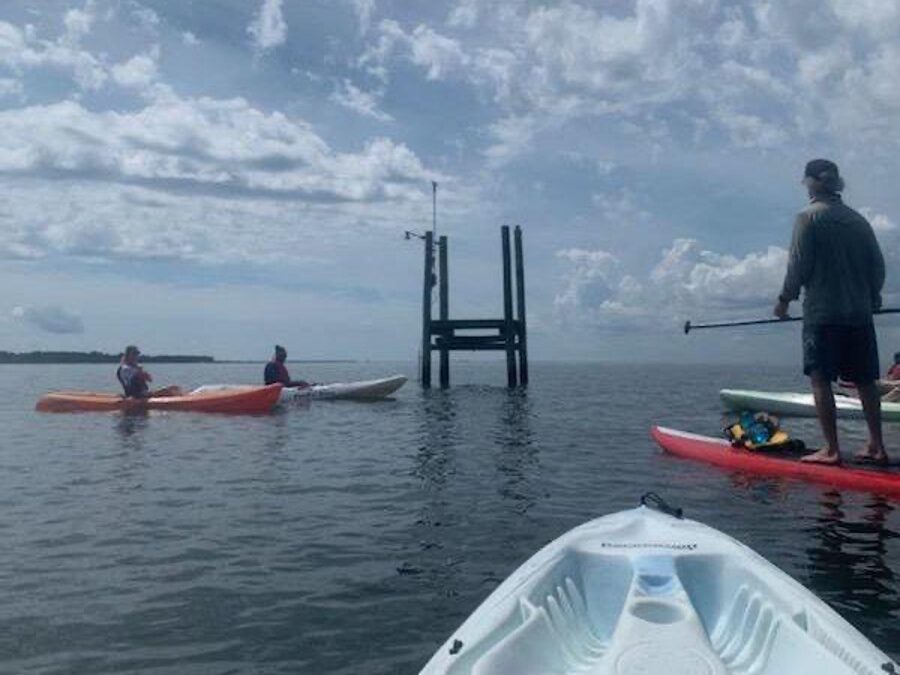Dr. Jake Hochard said it best, “Working with Andy is like caffeinating through osmosis.” All who know Dr. Andy Keeler would have to agree with that vivid characterization. “He’s always energetic, lighthearted, and ready to set the gold standard of quick and witty sarcasm,” continued Dr. Hochard, a former colleague of Keeler’s at CSI, now at the University of Wyoming.
Indeed, Dr. Keeler’s unique personality, humor, and wit will be missed, not to mention his impressive intellect and keen perspective when he retires at the end of this month. Dr. Keeler is wrapping up 10 years of service at the Coastal Studies Institute, as Public Policy and Coastal Sustainability Program Head, Professor of Economics, and Co-Director of UNC Institute for the Environment’s Outer Banks Field Site (OBXFS).
It was while a freshman at UNC Chapel Hill that his interest and curiosity in the environment were piqued. After being exposed to the ideas of influential activists and while participating in the Human Survival Symposium, he came “to understand the centrality of the environment to the human condition.”

“My interest has always been public policy-based, and economics has been an approach to public policy that I have always found both pragmatic and interesting,” he says. “Economic motivations are almost always a significant part of the motivations that drive people’s choices and actions that affect our relationship with the broadly understood natural environment.”
Dr. Keeler’s affinity for the topics of climate change, environmental risk, and ecosystem service assessments took him all over the country, including to the White House where he served on the climate change policy teams under the Clinton and Bush administrations and as a senior economist for the Environmental Protection Agency (EPA) and the United Nations (UN).
One career accomplishment he is particularly proud of is the work he performed as a UN expert researcher in Tanzania. His ideological approach in conjunction with the policies he developed regarding the country’s food marketing system resulted in an effective and fair structure, ultimately averting a food crisis. Another stand-out moment was his contribution as the Senior Staff Economist for Environment at the President’s Council of Economic Advisors regarding policies in climate-based international efforts.
While at CSI, Dr. Keeler has influenced the policy aspects of renewable ocean energy, ecosystem services, and adaptation to increasing coastal change. He considers his most important role here to have been “understanding and demonstrating, with colleagues, the importance of positive feedback between public policy and market decisions in coastal adaptation that can have a significant effect on how communities should approach risk-reducing infrastructure.”
“Andy’s wide and varied set of experiences always bring a deep, nuanced, and thoughtful perspective to his research, teaching, and collaborations,” states colleague Dr. Linda D’Anna (Research Associate, CSI). “His work, from negotiating sustainability policy to the many student research projects we have overseen together, demonstrates this keen ability to take complex, even controversial, topics and seemingly effortlessly get to the heart of the matter.”
Dr. Lindsay Dubbs, Co-Director of OBXFS, echoes Dr. D’Anna’s comments, “Andy has been a constant as the Coastal Studies Institute and the Outer Banks Field Site have undergone many changes, so it is difficult to imagine either entity without him as an integral part. Our academic and coastal communities have benefitted from Andy’s ideas and broad-scale and pragmatic perspectives.”
Following this year’s OBXFS Capstone presentation, the students presented Dr. Keeler with a touching video of messages submitted by present and former students. Some shared that he had influenced and helped shape their career paths, others simply expressed their enjoyment of participating in the classes he taught. Each was thankful for the opportunity to have spent time under his direction.
Although retiring, Dr. Keeler couldn’t simply pull the plug on his interest in the environment. He plans to continue participating in adaptation projects with a non-government organization and in performing volunteer work with the Union of Concerned Scientists and the Coastal Policy Center at the College of William and Mary. The faculty and staff of the Coastal Studies Institute extend their warmest congratulations and thanks to Dr. Keeler and wish him a long and happy retirement.



 Based at the Coastal Studies Institute (CSI), the North Carolina Renewable Ocean Energy Program (NCROEP) advances inter-disciplinary marine energy solutions across UNC System partner colleges of engineering at NC State University, UNC Charlotte, and NC A&T University. Click on the links below for more information.
Based at the Coastal Studies Institute (CSI), the North Carolina Renewable Ocean Energy Program (NCROEP) advances inter-disciplinary marine energy solutions across UNC System partner colleges of engineering at NC State University, UNC Charlotte, and NC A&T University. Click on the links below for more information. ECU's Integrated Coastal Programs (ECU ICP) is a leader in coastal and marine research, education, and engagement. ECU ICP includes the Coastal Studies Institute, ECU's Department of Coastal Studies, and ECU Diving and Water Safety.
ECU's Integrated Coastal Programs (ECU ICP) is a leader in coastal and marine research, education, and engagement. ECU ICP includes the Coastal Studies Institute, ECU's Department of Coastal Studies, and ECU Diving and Water Safety. The ECU Outer Banks campus is home to the Coastal Studies Institute.
The ECU Outer Banks campus is home to the Coastal Studies Institute.

